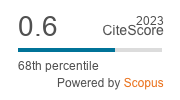Red Njegoš, a New Ideological Reading of the Montenegrin Metropolitan in the First Years of Communist Government
DOI:
https://doi.org/10.22586/csp.v51i3.9723Keywords:
Montenegro; Njegoš; Gorski vijenac; Communist Party; literatureAbstract
The paper analyses the attitude of communist authorities in Montenegro towards the Montenegrin metropolitan and one of the most important South Slavic writers of the 19th century, Petar II Petrović Njegoš. His work, primarily the book Gorski vijenac, is said to be the cornerstone of Montenegrin spirituality. Unlike other writers of that period, the Communist Party could not dismiss Njegoš’s work. On the contrary, the work of the poet was interpreted in a new way by the Party, which used it in its efforts to build a new socialist society. Through the analysis of archival material, periodicals, and other sources, the author explains the new relationship of communist authorities towards the works of Petar II Petrović Njegoš. A special focus is placed on two events, the centenary of the publication of Gorski vijenac in 1947, and the centenary of Njegoš’s death in 1951, when the intentions of the Communist authorities to recognize and point out that the literary opus of Njegoš fits into a new, ideological context of a socialist state became clear.
Downloads
Published
How to Cite
Issue
Section
License
Copyright (c) 2019 authors and journal

This work is licensed under a Creative Commons Attribution-NonCommercial 4.0 International License.
Copyright holders are the publisher Croatian Institute of History and the authors. Journal of Contemporary History is an Open Access journal. Users are allowed to read, download, copy, redistribute, print, search and link to material, and alter, transform, or build upon the material, or use them for any other lawful purpose as long as they attribute the source in an appropriate manner according to the Creative Commons licence CC BY-NC. The papers published in Journal of Contemporary History can be deposited and self-archived in the institutional and thematic repositories providing the link to the journal's web pages and HRČAK. Journal does not charge article processing charges (APC). The editors assume no responsibility for statements of fact or opinion made by contributors.




